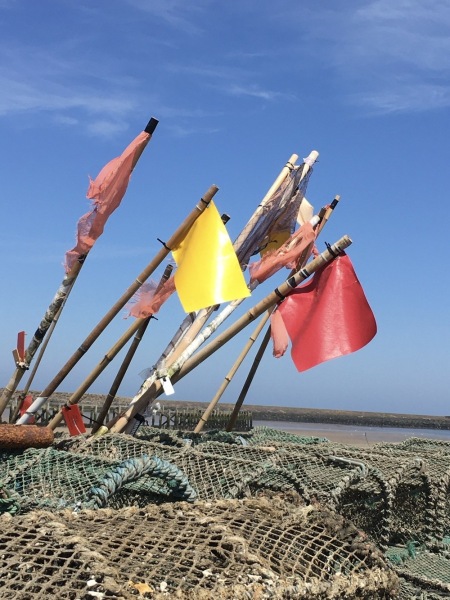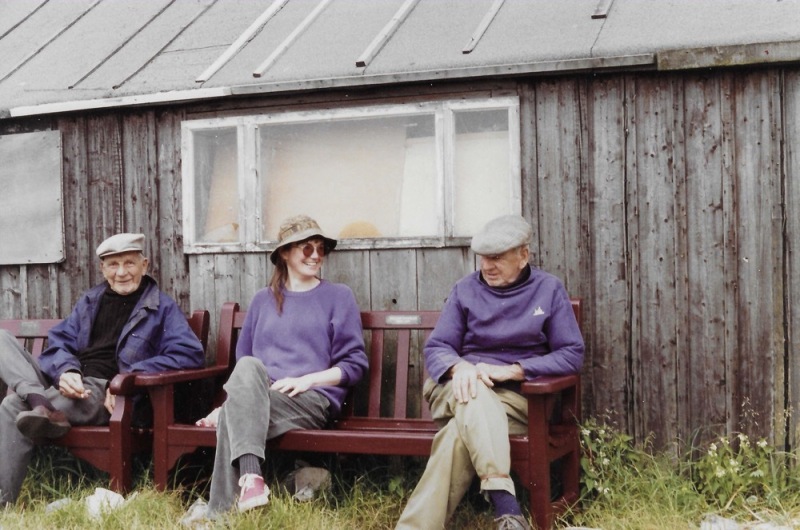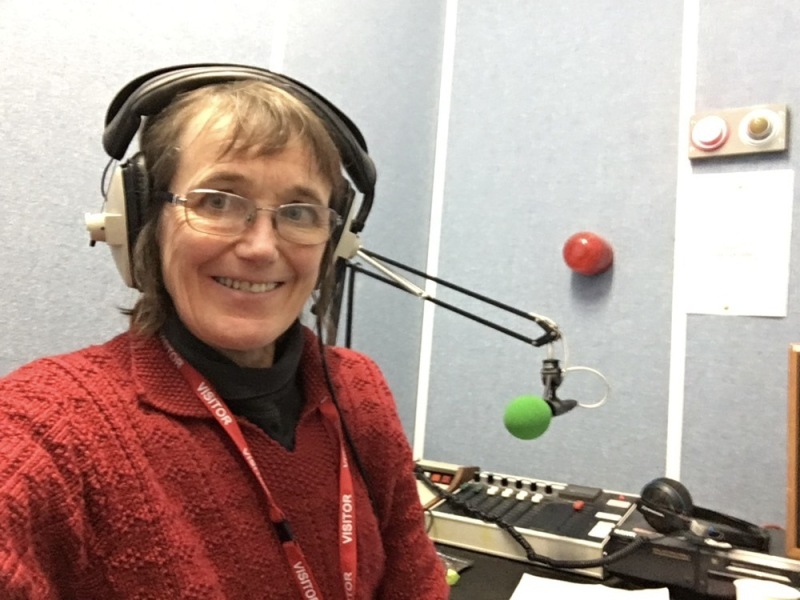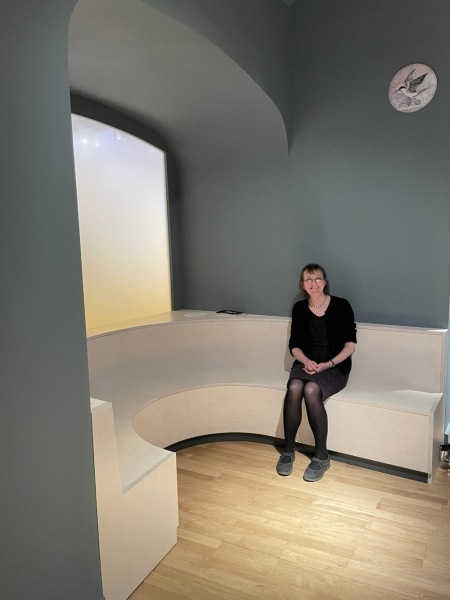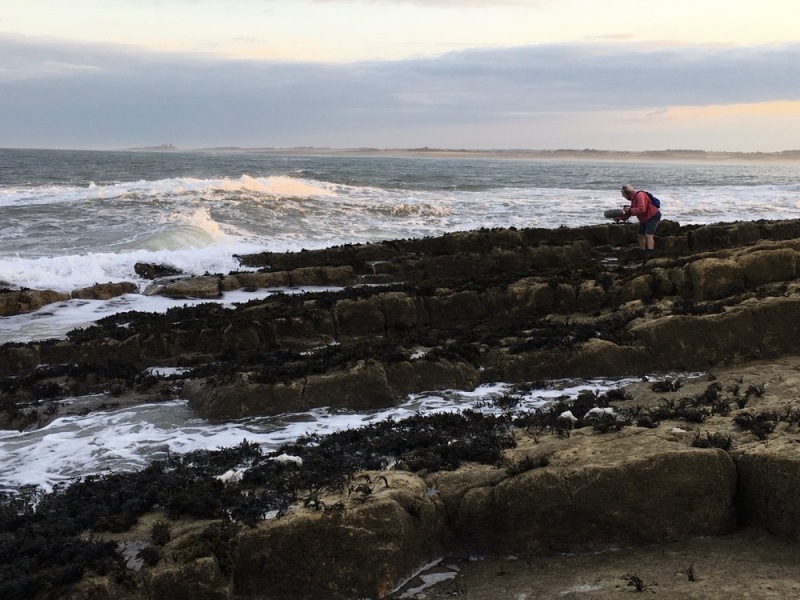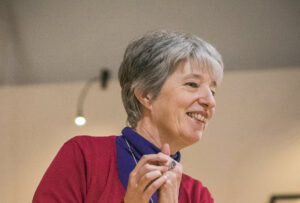Rowan Bell talks to Katrina Porteous about the power of dialect words, plagiarism, and writing for radio
A few months ago I interviewed Katrina Porteous about her forthcoming collection Rhizodont, and our conversation ranged so widely that we decided to get together again in Amble for more poetic gossip. We met in the Old Boat House for a seafood lunch of crab, but it was full and too noisy for an interview. As we left the restaurant Katrina asked the waitress if the crab we’d eaten was Amble or Shields. “Shields”, said the waitress. “I thought so,” said Katrina. A lifetime of working with local fisherman has given her a discerning taste in crabs. As we walked down Queen’s Street to Kayleigh’s Kitchen for a quiet cup of tea, I wondered what the sea equivalent of ‘terroir’ was in Northumbrian fisherman’s dialect.
Our conversation centred on Ted Hughes’s voice – how it seemed to arise from the natural world, harking back to a childhood spent among gamekeepers and smallholder farmers in the Yorkshire valleys and moors. When Hughes comes upon horses in a frosty dawn they are “Megalith-still. They breathed, making no move”. When his daughter looks at the reflection of the moon in a bucket of water, the cattle returning home along the lane close by are a “dark river of blood”.
Katrina distils a similar essence in her poetry from the dialect speech of Northumbrian fishermen, whose lives were tightly entwined with the sea. A few generations ago, she tells me, a fisherman’s words were always carefully chosen. Misspeaking, using the wrong words, could summon ill winds, a storm and tragedy. “I was interested in their belief in the power of words to affect nature,” she says. “There were many taboo words that you mustn’t say at sea, especially names of land animals. The famous example is the animal that gives us bacon, which they called a ‘guffy’.”
This wasn’t mere superstition, according to Katrina. “The expressiveness of the dialect and its rhythms often seemed, not just to name a creature, but to summon it. Think of two birds, one quick, light and graceful, the other dark and awkward. One is a ‘pickie’, the other a ‘gormer’. You can hear the essence of the deft little tern and the brooding cormorant in those names. There are many such examples in the fishermen’s dialect, and they seem close to Hughes’s shamanic concept of poetry which ‘evokes’ rather than ‘invokes’ its subject.”
One is a ‘pickie’, the other a ‘gormer’. You can hear the essence of the deft little tern and the brooding cormorant in those names
Time was getting on. Kayleigh’s Kitchen closed at 3 pm and we were well past that now. The tables were being cleaned and children on the way back from pre-school were popping through the door to use the café toilet or for a piece of left over cake. We asked if we could stay a bit longer “Don’t worry”, the café owner said, “you finish your tea and I’ll clean up around you”.
There’s been a lot of discussion in the poetic world recently about plagiarism, and in the wider world about cultural appropriation. In poetry, with its abundant use of allusion, the concept gets a bit hazy. Using the fishermen’s words as she does, often quoting them directly, does Katrina think this could be seen as a form of appropriation?
“Poets have always derived poetry from everyday speech,” she says. “Think of the Border Ballads, which are based on Northumbrian and Lowland Scots speech rhythms. I’ve used anonymous quotes in many of my poems. I want to honour and be true to the people who spoke those words.” To illustrate this, she quotes from ‘This Far and No Further’, a long poem originally broadcast on BBC Radio 3:
Butter and eggs kept the house
And the wool paid the rent.
“And more recently, in Rhizodont, ” Katrina goes on, “there’s a sequence called ‘Wildlife’ which uses indirect quotes from children from an East Durham primary school. Only the names are changed”. She finds an example to show what she means:
Lloyd dreams of becoming an astronaut. At night,
He looks at the stars above the Numbered Streets,
Smashed glass, boarded-up windows: can’t understand
How space is infinite, but everything ends.
In using speech, Katrina feels she’s trying to be true to people’s lives – even to summon presences in Hughesian fashion.
This leads us to our last discussion topic: writing for radio. Over many years Katrina has created a number of unique ‘radio-poems’. What advice can she offer poets who would like to work in that medium?
“I certainly believe poetry’s best heard out loud,” she says. “There are now lots of alternative audio platforms. Podcasting’s a really good way to reach an audience. If you’re writing for radio, you must think radiophonically: consider the other sounds that’ll be part of your piece, and respond to them with your words. In ‘The Refuge Box’, for example, I used words containing ‘ooo’ sounds, to echo the seals calling over the sand flats. In ‘Dunstanburgh’, the rhythm of the chant echoes the kittiwakes’ cries.”
[Radio] commissioners are always looking for fresh ideas – ways of using poetry that haven’t been done before
But how can a poet break into radio in the first place? “Radio’s about the writer’s relationship with a producer,” Katrina says. “Nowadays, many BBC programmes are made by independent production companies. These are named at the end of the programme. I would advise a poet to do their research: find the companies which make programmes you like, and approach them directly with a couple of paragraphs describing what you want to do. If they like your idea they’ll submit it to the BBC commissioning round, which takes place in spring and autumn. This is highly competitive, but commissioners are always looking for fresh ideas – ways of using poetry that haven’t been done before.”
A recent collaboration between Katrina and producer Julian May, ‘The Susurrations of the Sea’, combines documentary, science and poetry. This theme of evoking the natural world has threaded through our conversation. So, does Katrina think of herself as a ‘nature writer’?
“I’m very wary of that term,” she says. “A lot of current ‘nature writing’ seems to me to be ‘about’ nature, looking in on it from outside. I’d rather feel that – whatever I write about – I’m immersed in it, trying to make sense of it, trying to be true to it and to convey its essence from within.”

